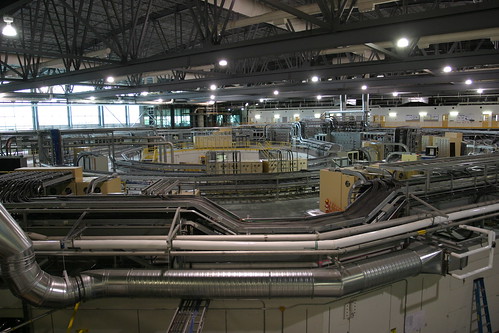
The Synchrotron Radiation Source (SRS) at the Daresbury Laboratory in England was shut down on Monday. It was used for some bad-ass research over its 28 year operating life, including some crystallography work which was awarded the Nobel Prize in 1997.
It was a 2 GeV ring[1], which still compares pretty favourably to newly built ones (the Canadian Light Source,[2] for example, is a third-generation synchrotron opened in 2004, and operates at 2.9 GeV).
Even though the UK community has shifted its focus to the Diamond Light Source (a 3 GeV third-gen opened in 2007), it's a bit sad to see such an amazing tool for discovery shut down. Good night, sweet prince!
[1] This is a measure of how much energy to accelerate particles (typically electrons for these facilities) through the ring. Higher energy means you can access higher energy radiation, though the flux you get at the desired radiation depends on the insertion device you're using. For more information, see: Sham, T. K.; Rivers, M. L. Reviews in Mineralogy and Geochemistry 2002, 49.
[1a] Mostly for comparison's sake, the black-hole inducing Large Hadron Collider is a 7 TeV proton accelerator, which is used for an entirely different purpose. Which really demands its own post at a later date.
[2] On a related note, the weekend will mark the return of the Fluxmasters to the CLS! I may or may not be able to make a sleep-deprived post or two after being awake for a day and a half. Huzzah!
Tuesday, August 5, 2008
SRS Daresbury syncrotron shut down
Tags
CLS,
srs darsebury,
synchrotron
Subscribe to:
Post Comments (Atom)

3 comments:
Also, anonymous commenter: seeing as I'll be, um, horrendously busy this whole weekend, I hope you don't mind too much getting your prize in a bit. Who knows, I'll try to snag you a souvenir if all goes well.
Sad times, R.I.P. Btw what does that comment mean?
err, sorry. from my previous post aboug Danial Nocera. they were the winner of my pseudocontest, and I didn't want anyone to think that I was finking out on sending them the goods.
Post a Comment